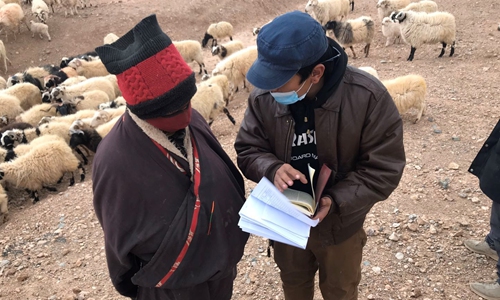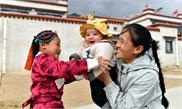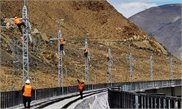Tibet stays alert on imported COVID-19 cases with closed ports and strict administration

An epidemic prevention worker communicates with a local villager at Yuduo village, Ali prefecture of Southwest China’s Tibet Autonomous Region Photo: Tsering Tarchin
Southwest China's Tibet Autonomous Region has been applying strict measures during the COVID-19 pandemic, which have reached the most remote areas in the country. The medical authority in China also has sent experts to Tibet to enhance border administration and avoid imported cases from neighbor countries.
"Now most of the herdsmen in our village know they should wear a face mask when they go to the county town for shopping," Tsering Tarchin, an official at Yuduo village, Ali prefecture, told the Global Times on Monday. "Villagers would come to the village committee to take their temperature and record it before they enter town."
The village committee has been constantly promoting the importance of virus prevention. When the epidemic was severe in Hubei Province, the committee shared written and audio materials in Tibetan language through WeChat. When the situation improved, they visited the herdsman families scattered in Ali's valleys, to give out medicines and share information.
Tibet only reported one confirmed case of the coronavirus, who is a tourist from Wuhan, Central China's Hubei Province. He was discharged from the hospital in Lhasa on February 12.
India's confirmed cases of the COVID-19 is approaching 30,000 as of press time. The number in Nepal is 52.
"Usually the Pulan port opens in April or May, but it seems this year it is not very likely [to open] due to the pandemic," Li Xiuwen, a hotel owner in Pulan county, Ali, where the port connects India and Nepal, told the Global Times on Tuesday. He said that the seasonal port closed in October last year.
According to notices on April 12, Pulan and Gyirong, China-Nepal border ports in Xigaze prefecture in Tibet, would continue to be closed for people to pass.
Li is worried about his business. Usually 80 percent of rooms in his hotel could be booked by domestic and foreign tourists or merchants, but recently he only received several tourists who drove to the destination.
The Mount Kangrinboqe and Lake Mapham Yutso in Pulan are considered holy for many Indians. Each year, thousands of Indians would cross the border for pilgrimage from June.
Li noted that Tibet is reopening to domestic tourists. "If you have the green health code, and apply for a 'border defense document' in your city, you could come to visit," he said.
The National Health Commission has sent 16 experts to provincial regions in Southwest China, including Yunnan, the Tibet and Guangxi Zhuang Autonomous regions. The experts will help each border port to make a unique strategy to decrease the risk of imported cases, according to a State Council press conference on Monday.
To maintain the entry and exit order at border regions, the National Immigration Administration applied a joint prevention and control system with strengthening police forces and using equipment like drones and surveillance. Border residents are also told not to guide, transfer or host those illegally crossing the border. Reporting illegal border crossings could be rewarded.



